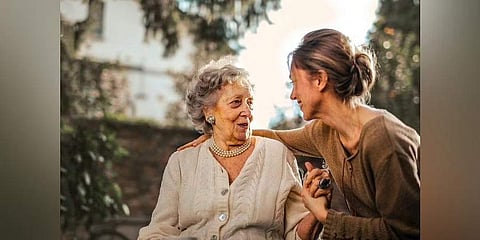
- LIFESTYLE
- FASHION
- FOOD
- ENTERTAINMENT
- EVENTS
- CULTURE
- VIDEOS
- WEB STORIES
- GALLERIES
- GADGETS
- CAR & BIKE
- SOCIETY
- TRAVEL
- NORTH EAST
- INDULGE CONNECT

Between Taiwan and Japan’s mainland, lies Okinawa, a Japanese prefecture comprising more than 150 islands. It’s one of the original blue zone longevity hotspots, where the world’s healthiest people live. With the average life expectancy of 90 years for women and 84 for men, the islanders’ way of life, especially the practice of Hara Hachi Bu or eating until you are 80 percent full, has become a benchmark for both healthcare providers and those wishing to invest in their well-being. We look at how this practice promotes a sense of sustained well-being.
Hara Hachi Bu teaches one to eat mindfully. It trains the brain to stop when almost full, which helps reduce overeating. “Consuming more calories than you burn may lead to a disruption of your natural hunger signals, which can trigger digestive issues and chronic conditions. Overeating can also cause premature ageing due to cell damage. This happens because overeating activates an otherwise dormant immune system pathway in the brain, signalling immune cells to destroy ‘invaders’, triggering diseases,” says Bengaluru-based nutrition scientist Reetha Rau.
To remain agile, energetic and mostly disease-free like the Okinawans, eat mindfully and slowly, and stop when you’re 80 percent full. This will aid digestion and build your threshold to tolerate minor bodily discomforts. “Take baby steps while putting Hara Hachi Bu into practice. As a starting point, take a small plate (this step is crucial as it will limit the serving size), and put all the food you want to eat, but before you start, take five bites from it and keep it aside. Have the rest slowly. Take this up to 15 bites over two weeks,” says Rau. Besides that, eat slowly to help reduce calorie intake and limit distractions so you are more aware of how much food you need, and know when to stop.
Another practical way to be fighting fit like the Okinawans is to stock up on a lot of green and yellow vegetables. The former is associated with a reduced risk of heart disease, high blood pressure and obesity, and the latter is replete with Vitamins and antioxidants, good for immune function, healthy bones, in addition to improved mood. According to Craig Willcox, the author of the book, Okinawa Program, the Okinawans typically eat seven different fruits and vegetables and 18 different foods a day, and more than 200 different foods and spices regularly in their overall diet. “The inclusion of such a variety of fruits and vegetables help meet nutritional deficiencies. They are all anti-ageing in nature,” says Rau.
OTHER CULTURAL LONGEVITY PRACTICES
In good company
Moai, an Okinawan longevity tradition, dates back centuries. Back then, Moais were formed to collect resources from the village folk to undertake a public project that benefitted all. It also acted like a ‘bank’ for emergency borrowing. Later, it became a sharing ground for social and spiritual engagements. “Create your own moai by adding new friends to your circle, and scheduling regular activities with them. Join a social group or a private club. Play a group sport,” says Gurugram-based psychologist Raghuram Swami.
Propelled by purpose
The importance of ikigai or ‘your reason for being’ in Japanese culture can be a positive psychological factor. Inculcating a sense of purpose gives an impetus to positive behaviours that add life to the years. Having Ikigai was associated with a 31 percent lower risk of developing functional disability and 36 percent lower risk of dementia during the three-year follow-up, according to a 2022 study published in ScienceDirect, an online database of scientific and medical research.